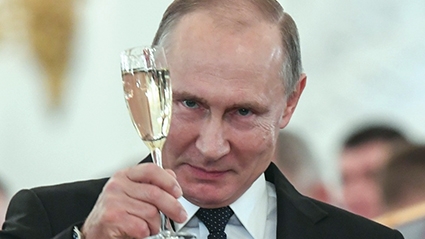Despite Victory, Putin Now Faces his Main Dilemma: Succession
Op-ed
On March 18, Russia elected Vladimir Putin for a fourth presidential term making his rule the longest since Joseph Stalin’s. But this next is set to be a far different term for Putin and the Russians. Moreover, beyond the foreign and domestic challenges Putin will face arguably the most important question: who will succeed him in 2024?
In previous editions of GT, I have written that Russia’s long-term foreign policy challenge will be breaking a more-or-less united Western front. Here, I would like to focus on a number of other geopolitical theaters Russian diplomacy will be actively involved in.
Putin will face three major foreign policy questions in his new term: finalizing a settlement in Syria; reaching a consensus with Japan over the Kuril Islands, and resolving the Ukraine conflict.
In Syria, Russia will be finding it more difficult to keep its powerful position constantly challenged by various regional actors. At the same time, as Bashar al-Assad’s government strengthens, Putin will increasingly be looking at an exit strategy (without withdrawing its military contingent).
The Japanese PM Shinzo Abe is expected to visit Russia later this spring for yet another summit with Putin. Abe continues to strive for a final settlement to the Kuril Islands matter, and for a formal peace treaty with Russia.
And perhaps the most important theater for Putin will be Ukraine, where he could make some concessions such as de-escalation of fighting in east Ukraine and perhaps even facilitate a long-term ceasefire. However, strategically, his government will be working intensively to keep Kyiv out of NATO and the EU.
Beyond the foreign policy front, Putin will have a Russia changing from within. The most noticeable development recently is that the center of gravity in the Russian opposition to Putin for the coming years will lie with communists and nationalists, not liberals and democrats.
This correlates well with the existing trend across the county that there is a pull towards a stricter rule where all seeming regional autonomies are restricted. Tatarstan, one of the richest regions, already experienced this when the Kremlin decided not to continue the power-sharing deal with Kazan. State security apparatuses set to gain a bigger influence – a trend well visible over the past couple of years.
Problems are also seen among the Russian youth. Although many (and perhaps the majority) of youngsters do not contest the Putin rule, and Putin is unlikely to face a significant opposition in this milieu, many, however, believe that Putin’s rule should not continue. For them, he has been the only leader they remember. The Kremlin is now concerned over protest-sentiments among schoolchildren and students.
The sidelining of liberals and the general trend towards tighter control has been a hallmark of Russian history. Numerous Russian emperors and various rulers (including former president Dimitri Medvedev) promised to introduce liberal-based rule, which eventually turned out to be impossible.
But there is also one important nuance to Putin’s new term – constitutionally, it will be his last. Moreover, by 2024 (end of term), Putin will be of quite an advanced age, leading many to expect a new ruler in six years’ time. Indeed, Putin himself, in his victory speech this election, hintedto his age and the reality that he will not be around forever. It is thus likely that in the coming years, Putin will work to set the foundation for a future transition through constant reshuffles and gradually promoting his potential successor, though undoubtedly, Putin will likely continue to play a major role from behind the scenes.
It is also likely that the Russian president will change the constitution. He has refuted any possibility of his doing so, but this will depend on both the domestic and foreign situation. In fact, this pull towards perpetuation of the presidential rule has been visible all across the former Soviet space, and Putin may well follow the lead.
Putin’s new fourth term will be foundational in many ways as Russia’s foreign policy and internal development unfolds. This merits meticulous analysis of Russia on behalf of her neighbors (primarily Georgia) which experiences difficult relations with Moscow.
Emil Avdaliani












